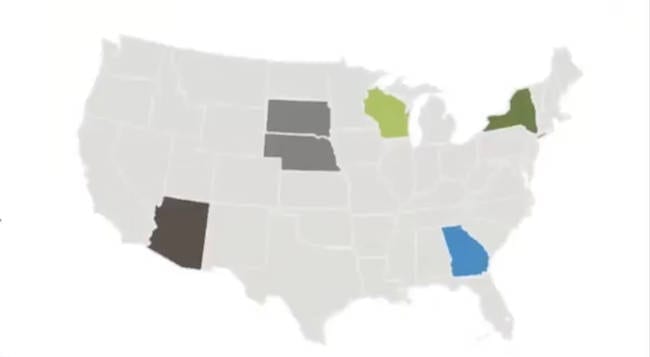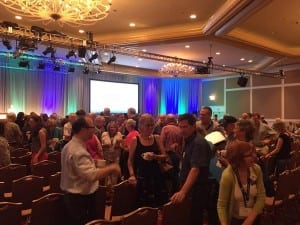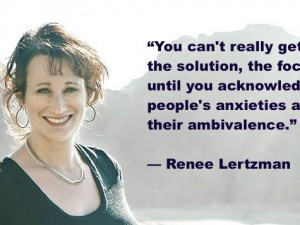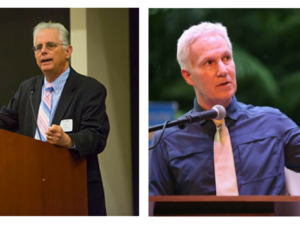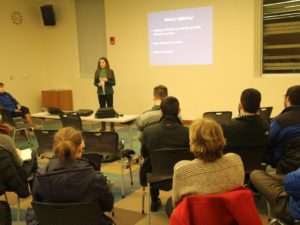Strategies for success: Climate advocacy in rural America
By Pam Shaouy
Did you know that three of this year’s top five most productive U.S. Citizens’ Climate Lobby (CCL) chapters are nestled in communities with less than 1,000 residents? From Chatuge, Georgia to Birchwood, Wisconsin to the breadbasket of Nebraska, rural CCL chapters are finding unique ways to engage their communities and be effective across all five levers of building political will. On a recent Citizens’ Climate University webinar, volunteers share their strategies.
Lobbying begins with listening: Columbia County, New York
Smaller scale farmers abound in rural Columbia County in upstate New York. They’re drivers of the local economy and important constituents. “Lobbying for a nationwide Carbon Fee and Dividend proposal begins with a whole lot of listening,” advises Jan Elise Storm of the CCL Columbia County, New York chapter and Agriculture Action Team Leader. “We had a lot to learn about the climate solution farmers wanted to tell us about—carbon farming.”
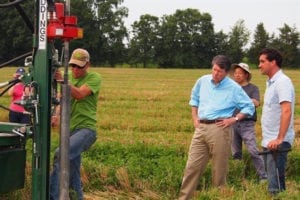
Congressman John Faso (R-NY) at Stone House Farm in Hudson, NY
To facilitate listening, the chapter hosted a community forum that brought together scientists, farmers and experts in land management. The forum offered an opportunity to share information about how carbon farming could help offset climate change and improve farmers’ long-term economic viability. Local political leaders also attended, including district U.S. Congressman John Faso. Faso shared what he learned with other members of Congress, and acted on what he learned by calling for incentives for carbon farming programs.
The forum got elected officials talking with constituents about climate solutions. And it gave farmers a platform to share their ideas. “CCL has earned trust with local farmers—and that’s helping to move the needle on getting them to begin to think about backing carbon pricing,” Storm observes.
Print media power: Chatuge, Georgia
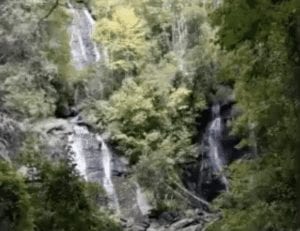
Dixon describes Chatuge as a mountain community that values the beauty of the land.
Dr. Vernon Dixon, leader of the CCL Chatuge, Georgia chapter, lives in a small Georgia mountain town. “People just don’t want to talk about climate change. They think that’s a taboo issue and are afraid to speak out because what will people think of you,” he notes.
Dixon wanted to get residents talking about climate solutions. He decided to write his very first letter to the editor of his local newspaper. When the letter was published, Dixon was inspired to visit editors of local papers in neighboring towns and build relationships with them. “To my amazement, they very much supported climate action and said keep the letters coming,” Dixon marvels.
The letters generated much interest. Local ministers and universities offered support. Dixon soon found himself giving presentations and hosting forums. His chapter grew and a neighboring chapter formed. Dixon’s chapter now gets five to six letters published in different papers every month.
“We started speaking up and writing about climate solutions in our papers. In your own community, you might feel like you’re too small or you can’t do big things, but I’m here to tell you—you can,” Dixon promises.
Guerilla grassroots outreach: Flagstaff, Arizona
The first Congressional district in the middle of Arizona is one of the biggest in the U.S. It includes Grand Canyon National Park and several native nations. To get to know its widely dispersed residents better, the chapter decided to hit the road with the CCL Tour for a Livable Planet and Eatable Donuts. That’s right—a donut tour!
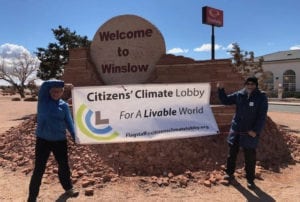
One person wanted to learn more about climate but didn’t want to leave her car, so the chapter talked to her about climate through a rolled down window and offered her donuts. Some asked Bayles to speak at local groups and invited CCL to return.
“We found that by moving and listening, we were able to make connections with people who wouldn’t otherwise be within our reach. We didn’t have immediate results, but we have seeds that were planted and we see some growth, and we’re encouraged,” Bayles remarks.
Grasstops outreach thaws silence: Birchwood, Wisconsin
People come to the small rural town of Birchwood to fish, hunt, snowmobile and cross country ski. So when Dan Herscher, leader of the CCL Birchwood, Wisconsin chapter, first grew concerned about shorter winters, he knew he needed to talk to the town’s tourist businesses about climate change. “You’re going to find out there’s a lot more interest and a lot more concern and people are looking for you to bring that up,” Herscher recommends.
Drawn to CCL’s bipartisan approach, Herscher drafted a custom leader letter to his Congress member asking for climate action. The letter didn’t outline a solution. It focused on things important to the community, like shorter winters, more intense rainfalls and recent flooding events.
The chapter used different chambers of commerce websites to identify and contact businesses. It also gave presentations at Rotary clubs—a key source of support because members tend to be business owners who know other business owners. Today, over 220 businesses and community leaders have signed the letter.
“One of the beauties of organizing at a rural level is that everybody knows everybody else,” Herscher elaborates, “so listen to what other people have to say and ask them who else you think you should be talking to.”
Creative chapter organizing: Chadron, Nebraska
The CCL Chadron chapter in the heart of Nebraska is one of the most rural in the country. Chapter co-leaders Steve and Cheryl Welsh have three tips for organizing in rural areas:
- You don’t have to have your monthly meeting on a Saturday. It can be during the work week. Invite people to bring something for a potluck dinner. A social atmosphere helps people chat and become more engaged.
- Don’t be afraid to ask for help. People like to feel needed. If they don’t have a role to fulfill, some may move onto another organization that utilizes their skills, so it can be counterintuitive to not want to impose on people.
- Think outside of traditional environmental groups and local farmer’s markets. Film parties, floats in local parades, and local auto and home builder’s trade shows can offer creative venues to help with outreach.
Already getting new ideas for developing and growing you rural chapter? Whatever creative path you choose, remember that CCL’s emphasis on respect and appreciation will help you succeed in your community.
Every week, Citizens’ Climate University hosts a live, online learning session to educate and empower climate action volunteers. Browse past lessons in CCL Community, and mark your calendar for upcoming sessions.

